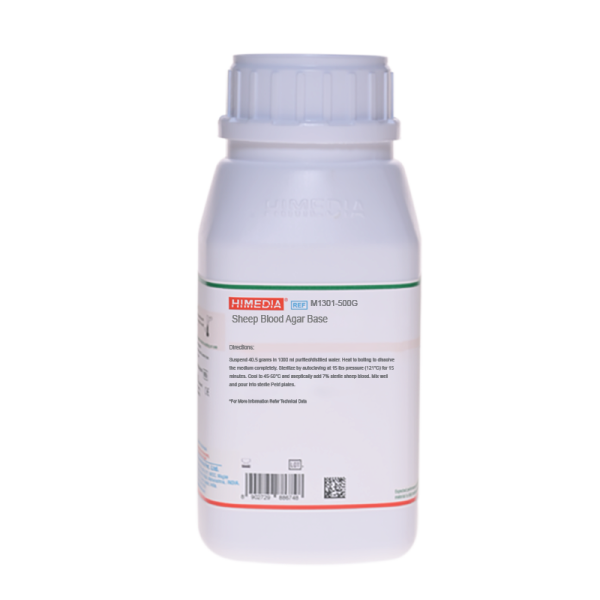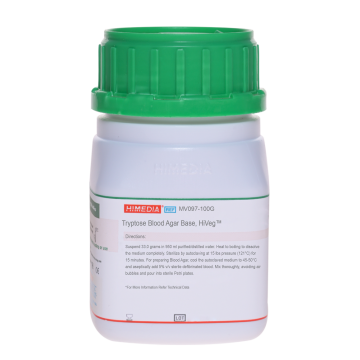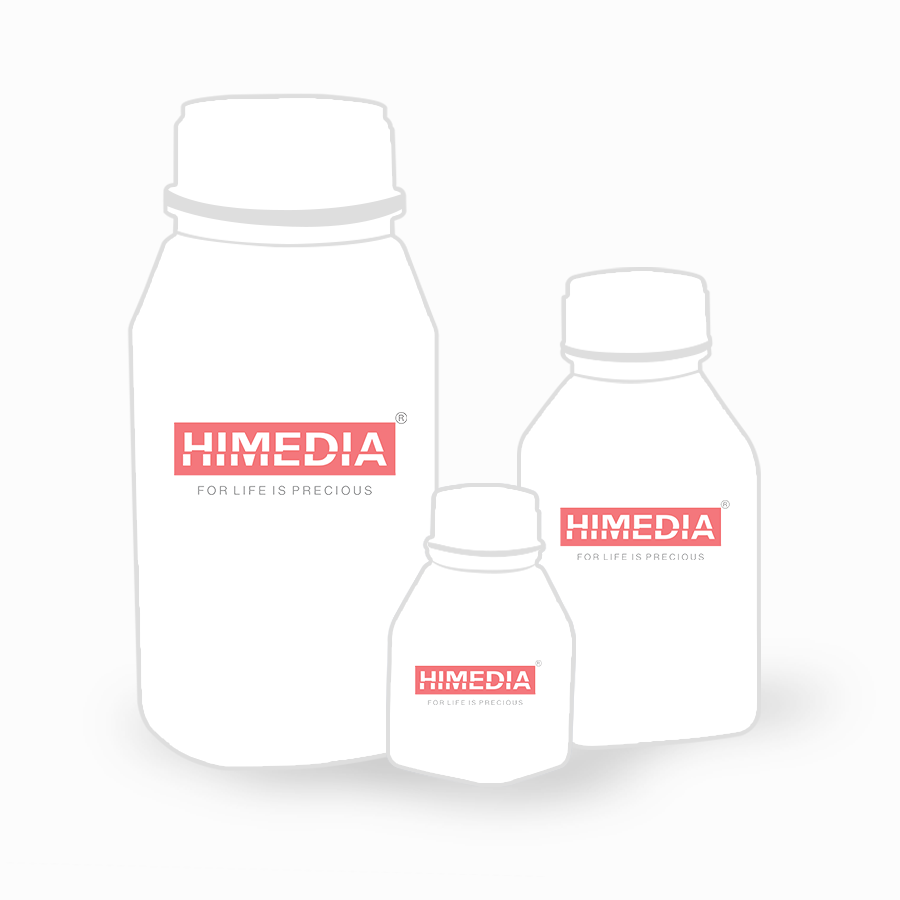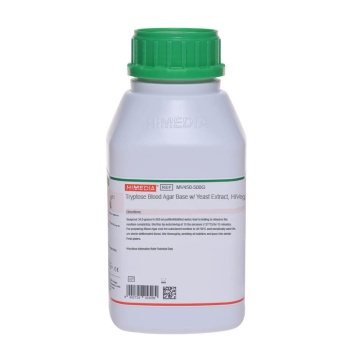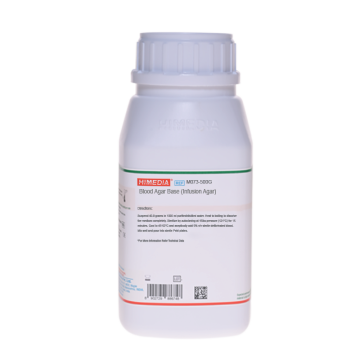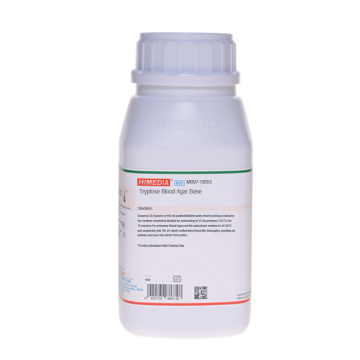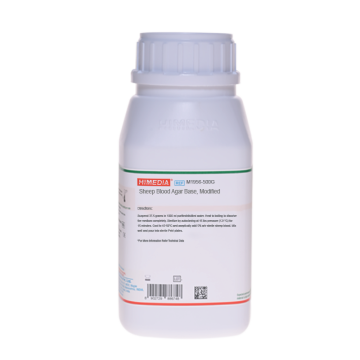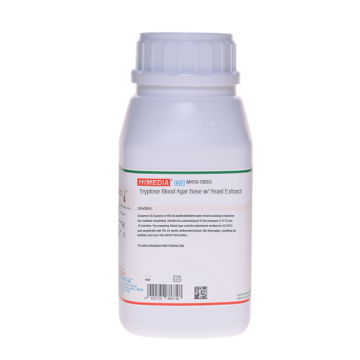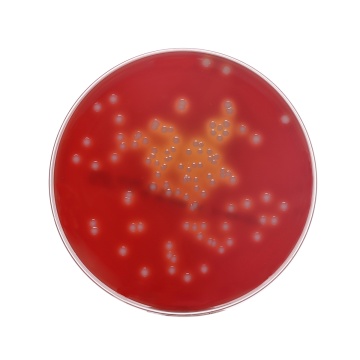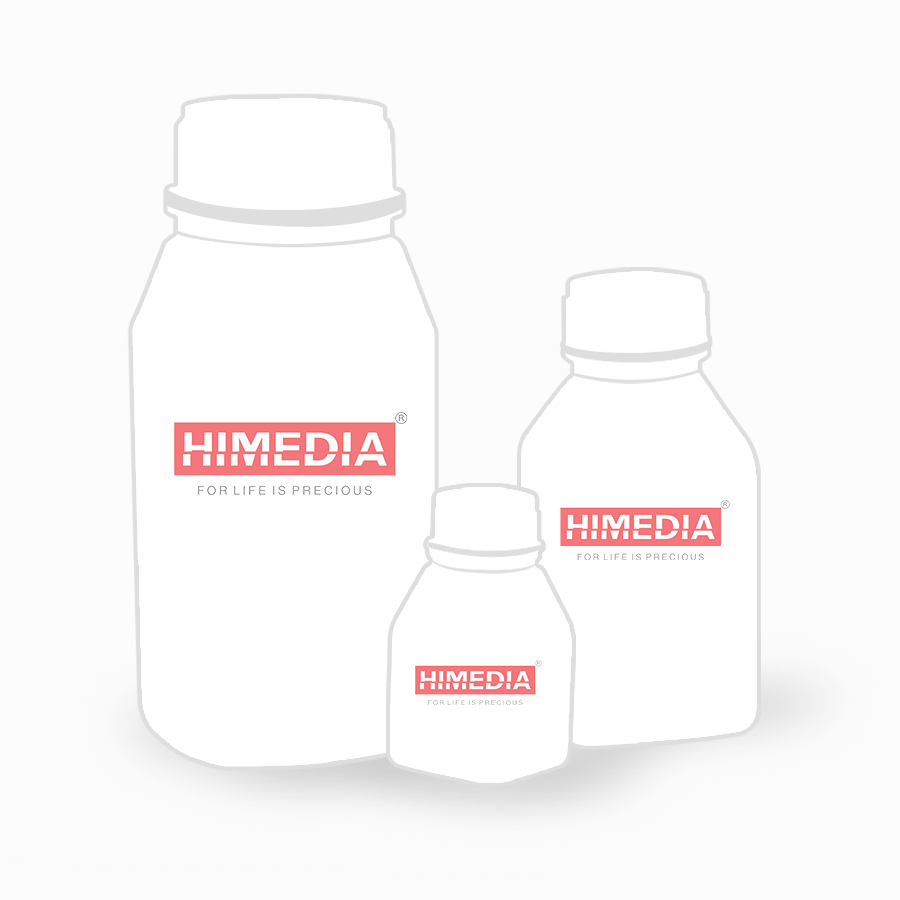 Your enquiry has been submitted
Your enquiry has been submitted
Sheep Blood Agar Base
Intended Use:
Recommended with addition of sheep blood, gives improved haemolytic reactions of organisms.
Composition**
| Ingredients | g/L |
|---|---|
| Tryptone | 14.000 |
| Peptone | 4.500 |
| Yeast extract | 4.500 |
| Sodium chloride | 5.000 |
| Agar | 12.500 |
Final pH (at 25°C): 7.3±0.2
**Formula adjusted, standardized to suit performance parameters
Directions
Suspend 40.5 grams in 1000 ml purified / distilled water. Heat to boiling to dissolve the medium completely. Sterilize by autoclaving at 15 lbs pressure (121°C) for 15 minutes. Cool to 45-50°C and aseptically add 7% sterile sheep blood. Mix well and pour into sterile Petri plates.
Principle And Interpretation
Haemolysins are exotoxins produced by bacteria that lyse red blood cells. The haemolytic reaction can be visualized on blood agar plates. On blood agar plates colonies of haemolytic bacteria may be surrounded by clear, colourless zone where the red blood cells have been lysed and the haemoglobin destroyed to a colourless compound. This is beta haemolysis. Other types of bacteria can reduce haemoglobin to methaemoglobin which produces a greenish zone around the colonies and is called alpha haemolysis (1). Gamma haemolysis is no haemolysis where no change in the medium is observed (2).
Blood Agar Base No. 2 (M834), supplemented with sheep blood is used to study haemolytic reactions (patterns) of organisms. But this gave mixed haemolytic (a and b) reactions due to the physiological differences between sheep blood and horse blood (3).
Sheep Blood Agar Base with added sheep blood was developed to allow maximum recovery of organisms without interfering with their haemolytic reactions. Sheep Blood Agar Base was formulated to be compatible with sheep blood and give improved haemolytic reactions of organisms.
Tryptone, peptone and yeast extract provide nitrogen, carbon, amino acids and vitamins. Sodium chloride maintains the osmotic balance. Sheep Blood Agar Base showed considerable improvement and the expected beta haemolytic reactions with S.pyogenes in comparison to other blood agar bases supplemented with blood.
Type of specimen
Clinical material: Pathological material
Specimen Collection and Handling
For clinical samples follow appropriate techniques for handling specimens as per established guidelines (4,5).
After use, contaminated materials must be sterilized by autoclaving before discarding.
Warning and Precautions
In Vitro diagnostic use only. For professional use only. Read the label before opening the container. Wear protective gloves/ protective clothing/eye protection/face protection. Follow good microbiological lab practices while handling specimens and culture. Standard precautions as per established guidelines should be followed while handling clinical specimens. Safety guidelines may be referred in individual safety data sheets.
Limitations
- Further biochemical and serological tests must be carried out for further identification.
Performance and Evaluation
Performance of the medium is expected when used as per the direction on the label within the expiry period when stored at recommended temperature.
Quality Control
Appearance Cream to yellow homogeneous free flowing powder
Gelling Firm, comparable with 1.25% Agar gel.
Colour and Clarity of prepared medium Basal medium yields light yellow coloured clear gel without any precipitate. On addition of 7% sheep blood, cherry red coloured opaque gel forms in Petri plates
Reaction Reaction of 4.05% w/v aqueous solution at 25°C. pH: 7.3±0.2
pH 7.10-7.50
Cultural Response
Cultural characteristics observed after an incubation at 35-37°C for 18-24 hours with added 7% v/v sterile sheep blood.
| Organism | Inoculum (CFU) | Growth | Recovery | Haemolysis |
|---|---|---|---|---|
| Streptococcus pneumoniae ATCC 6303 | 50-100 | luxuriant | >=70% | alpha |
| Streptococcus pyogenes ATCC 19615 | 50-100 | luxuriant | >=70% | beta |
Storage and Shelf Life
Store between 10- 30°C in a tightly closed container and the prepared medium at 2 - 8°C. Use before expiry date on the label.
On opening, product should be properly stored dry, after tightly capping the bottle in order to prevent lump formation due to the hygroscopic nature of the product. Improper storage of the product may lead to lump formation. Store in dry ventilated area protected from extremes of temperature and sources of ignition Seal the container tightly after use. Product performance is best if used within stated expiry period.
Disposal
User must ensure safe disposal by autoclaving and/or incineration of used or unusable preparations of this product. Follow established laboratory procedures in disposing of infectious materials and material that comes into contact with clinical sample must be decontaminated and disposed of in accordance with current laboratory techniques (4,5).
Reference
- Pelczar M. J. Jr., Reid R. D., Chan E. C. S., 1977, Microbiology, 4th Ed., Tata McGraw-Hill Publishing Company Ltd, New Delhi.
- Koneman E. W., Allen S. D., Janda W. M., Schreckenberger P. C., Winn W. C. Jr., 1992, Colour Atlas and Textbook of Diagnostic Microbiology, 4th Ed., J. B. Lippinccott Company.
- Spector W. S., (Ed.), 1961, Handbook of Biological Data, W. B. Saunder Company, Philadelphia and London.
- Isenberg, H.D. Clinical Microbiology Procedures Handbook 2nd Edition
- Jorgensen, J.H., Pfaller, M.A., Carroll, K.C., Funke, G., Landry, M.L., Richter, S.S and Warnock., D.W. (2015) Manual Clinical Microbiology, 11th Edition. Vol. 1.
| Product Name | Sheep Blood Agar Base |
|---|---|
| SKU | M1301 |
| Product Type | Regular |
| Physical Form | Powder |
| Origin | Animal |
| Packaging type | HDPE |
| References | 1. Pelczar M. J. Jr., Reid R. D., Chan E. C. S., 1977, Microbiology, 4th Ed., Tata McGraw-Hill Publishing Company Ltd, New Delhi. |
| Customized Product Available | No |



